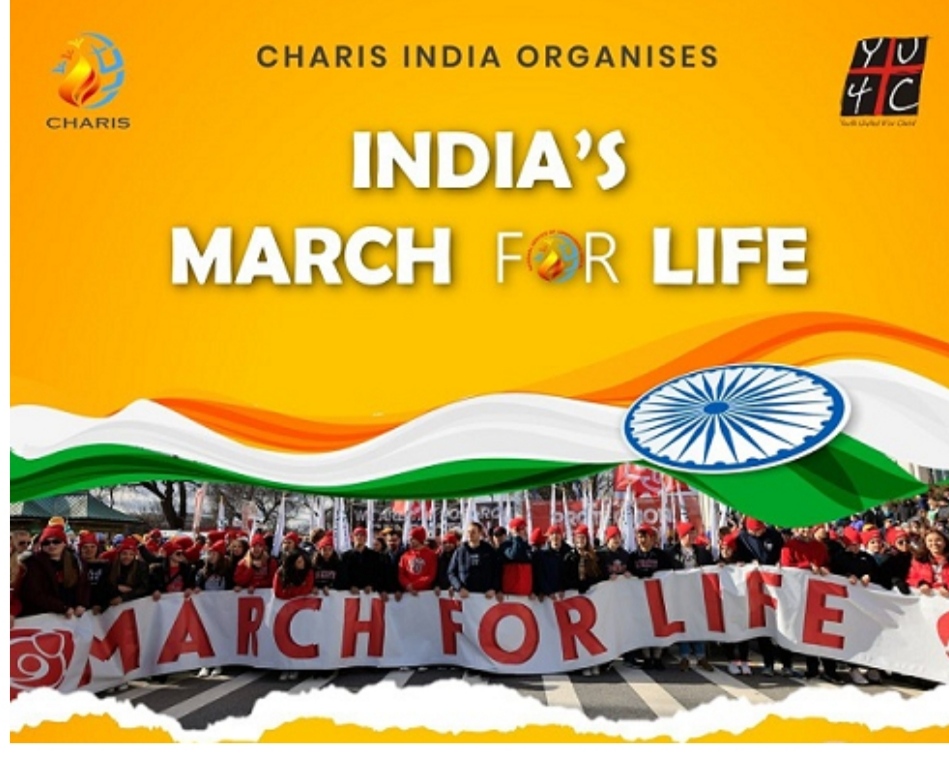March for Life in Pune against India’s abortion law
Cardinal Oswald Gracias led the event, undertaken by the youth wing of the Catholic Charismatic Renewal Services, Archbishop Francis Kalist of Pondicherry and Cuddalore told AsiaNews. The legalisation of abortion has been progressively expanded despite opposition by a majority of Indians from various religious groups.
Pune (AsiaNews) – Cardinal Oswald Gracias today led the “March for life” in Pune, Maharashtra, in opposition to India’s abortion law, while a delegation submitted a memorandum in favour of the rights of the unborn to local authorities.
The march began at St Patrick's Cathedral Hall with an exhibition from 10 am to 12 pm, followed by a public gathering and then the march.
"God is a God of life. But man has slowly forgotten this and lives and acts in a way that goes against life. One of them is abortion,” said Archbishop Francis Kalist of Pondicherry-Cuddalore, speaking to AsiaNews.
“It is said that more than 15 million abortions take place annually in our country. This is mainly because of the Medical Termination of Pregnancy Act that legalised abortion on 10 August, 52 years ago," noted the bishop, who is also national episcopal advisor to the Catholic Charismatic Renewal Services (CHARIS).
With respect to the latter, the prelate said: “We continued to pray and discern God's will and launched this ministry. The remarkable thing is that the youth wing of CHARIS India, the Youth United for Christ (YU4C), undertook the initiative.”
Then, “During the COVID-19 pandemic, we launched a six-month online programme, every Saturday evening, with relevant talks on the right to life given by well-known figures, even from abroad. This was done with the encouragement and support of His Eminence Oswald Cardinal Gracias. It was well attended,” the archbishop added.
“The March for Life is one of his programmes to conscientise the people against the evil of abortion. Last year it was in Delhi. This year we are having it in Pune. Next year, it will be in Thrissur.”
For Dr Pascal Carvalho, a member of the Committee for Human Life of the Archdiocese of Bombay (Mumbai), “This March for Life is a significant event to highlight the important sacredness of life and to uphold and defend the right to life and dignity of the most defenceless and vulnerable human being, namely the unborn child.”
India legalised abortion up to the 12 weeks of pregnancy and, in some circumstances, up to 20 weeks on 10 August 1971. Since then, legal access to abortion has been expanded several times, most recently in 2021, when the Indian parliament passed a law that allows abortions in some cases up to the 24th week.
In addition, in December last year, an Indian court allowed a woman to terminate her 33-week pregnancy, even though the hospital's medical council had informed the court that it had rejected the request for termination given the advanced stage of pregnancy.
According to research by the Pew Institute, at least half of adults in most of India’s major religious groups say that abortion should be illegal in most if not all cases.
Adults for whom religion is very important in their lives are more likely to say that abortion should be illegal than those for whom religion is less important.
This is why, “it is very important for religious leaders like Cardinal Gracias and Archbishop Kalist to be at pro-life public events like this march," said Dr Carvalho, who also served on the Vatican's Pontifical Academy for Life. With their participation, they “show their ardent defence and advocacy in promoting a culture of life in India.”
16/07/2022 17:12
24/10/2019 17:56
06/08/2021 13:48
09/04/2019 13:19







.png)










